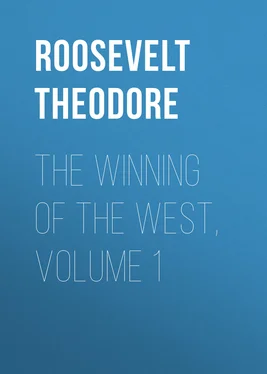Theodore Roosevelt - The Winning of the West, Volume 1
Здесь есть возможность читать онлайн «Theodore Roosevelt - The Winning of the West, Volume 1» — ознакомительный отрывок электронной книги совершенно бесплатно, а после прочтения отрывка купить полную версию. В некоторых случаях можно слушать аудио, скачать через торрент в формате fb2 и присутствует краткое содержание. Жанр: foreign_prose, История, foreign_edu, foreign_antique, на английском языке. Описание произведения, (предисловие) а так же отзывы посетителей доступны на портале библиотеки ЛибКат.
- Название:The Winning of the West, Volume 1
- Автор:
- Жанр:
- Год:неизвестен
- ISBN:нет данных
- Рейтинг книги:5 / 5. Голосов: 1
-
Избранное:Добавить в избранное
- Отзывы:
-
Ваша оценка:
- 100
- 1
- 2
- 3
- 4
- 5
The Winning of the West, Volume 1: краткое содержание, описание и аннотация
Предлагаем к чтению аннотацию, описание, краткое содержание или предисловие (зависит от того, что написал сам автор книги «The Winning of the West, Volume 1»). Если вы не нашли необходимую информацию о книге — напишите в комментариях, мы постараемся отыскать её.
The Winning of the West, Volume 1 — читать онлайн ознакомительный отрывок
Ниже представлен текст книги, разбитый по страницам. Система сохранения места последней прочитанной страницы, позволяет с удобством читать онлайн бесплатно книгу «The Winning of the West, Volume 1», без необходимости каждый раз заново искать на чём Вы остановились. Поставьте закладку, и сможете в любой момент перейти на страницу, на которой закончили чтение.
Интервал:
Закладка:
The task set to the son of Sehoy was one of incredible difficulty, for he was head of a loose array of towns and tribes from whom no man could get perfect, and none but himself even imperfect, obedience. The nation could not stop a town from going to war, nor, in turn, could a town stop its own young men from committing ravages. Thus the whites were always being provoked, and the frontiersmen were molested as often when they were quiet and peaceful as when they were encroaching on Indian land. The Creeks owed the land which they possessed to murder and rapine; they mercilessly destroyed all weaker communities, red or white; they had no idea of showing justice or generosity towards their fellows who lacked their strength, and now the measure they had meted so often to others was at last to be meted to them. If the whites treated them well, it was set down to weakness. It was utterly impossible to restrain the young men from murdering and plundering, either the neighboring Indians or the white settlements. Their one ideal of glory was to get scalps, and these the young braves were sure to seek, no matter how much the older and cooler men might try to prevent them. Whether war was declared or not, made no difference. At one time the English exerted themselves successfully to bring about a peace between the Creeks and Cherokees. At its conclusion a Creek chief taunted the mediators as follows: "You have sweated yourselves poor in our smoky houses to make peace between us and the Cherokees, and thereby enable our young people to give you in a short time a far worse sweat than you have yet had." 64 64 Adair, 279.
The result justified his predictions; the young men, having no other foe, at once took to ravaging the settlements. It soon became evident that it was hopeless to expect the Creeks to behave well to the whites merely because they were themselves well treated, and from that time on the English fomented, instead of striving to put a stop to, their quarrels with the Choctaws and Chickasaws.
The record of our dealings with them must in many places be unpleasant reading to us, for it shows grave wrong-doing on our part; yet the Creeks themselves lacked only the power, but not the will, to treat us worse than we treated them, and the darkest pages of their history recite the wrongs that we ourselves suffered at their hands.
CHAPTER IV.
THE ALGONQUINS OF THE NORTHWEST, 1769-1774
Between the Ohio and the Great Lakes, directly north of the Appalachian confederacies, and separated from them by the unpeopled wilderness now forming the States of Tennessee and Kentucky, dwelt another set of Indian tribes. They were ruder in life and manners than their southern kinsmen, less advanced towards civilization, but also far more warlike; they depended more on the chase and fishing, and much less on agriculture; they were savages, not merely barbarians; and they were fewer in numbers and scattered over a wider expanse of territory. But they were farther advanced than the almost purely nomadic tribes of horse Indians whom we afterwards encountered west of the Mississippi. Some of their villages were permanent, at any rate for a term of years, and near them they cultivated small crops of corn and melons. Their usual dwelling was the conical wigwam covered with bark, skins, or mats of plaited reeds but in some of the villages of the tribes nearest the border there were regular blockhouses, copied from their white neighbors. They went clad in skins or blankets; the men were hunters and warriors, who painted their bodies and shaved from their crowns all the hair except the long scalp-lock, while the squaws were the drudges who did all the work.
Their relations with the Iroquois, who lay east of them, were rarely very close, and in fact were generally hostile. They were also usually at odds with the southern Indians, but among themselves they were frequently united in time of war into a sort of lax league, and were collectively designated by the Americans as the northwestern Indians. All the tribes belonged to the great Algonquin family, with two exceptions, the Winnebagos and the Wyandots. The former, a branch of the Dakotahs, dwelt west of Lake Michigan; they came but little in contact with us, although many of their young men and warriors joined their neighbors in all the wars against us. The Wyandots or Hurons lived near Detroit and along the south shore of Lake Erie, and were in battle our most redoubtable foes. They were close kin to the Iroquois though bitter enemies to them, and they shared the desperate valor of these, their hostile kinsfolk, holding themselves above the surrounding Algonquins, with whom, nevertheless, they lived in peace and friendship.
The Algonquins were divided into many tribes, of ever shifting size. It would be impossible to place them all, or indeed to enumerate them, with any degree of accuracy; for the tribes were continually splitting up, absorbing others, being absorbed in turn, or changing their abode, and, in addition, there were numerous small sub-tribes or bands of renegades, which sometimes were and sometimes were not considered as portions of their larger neighbors. Often, also, separate bands, which would vaguely regard themselves as all one nation in one generation, would in the next have lost even this sense of loose tribal unity.
The chief tribes, however, were well known and occupied tolerably definite locations. The Delawares or Leni-Lenappe, dwelt farthest east, lying northwest of the upper Ohio, their lands adjoining those of the Senecas, the largest and most westernmost of the Six Nations. The Iroquois had been their most relentless foes and oppressors in time gone by; but on the eve of the Revolution all the border tribes were forgetting their past differences and were drawing together to make a stand against the common foe. Thus it came about that parties of young Seneca braves fought with the Delawares in all their wars against us.
Westward of the Delawares lay the Shawnee villages, along the Scioto and on the Pickaway plains; but it must be remembered that the Shawnees, Delawares, and Wyandots were closely united and their villages were often mixed in together. Still farther to the west, the Miamis or Twigtees lived between the Miami and the Wabash, together with other associated tribes, the Piankeshaws and the Weas or Ouatinous. Farther still, around the French villages, dwelt those scattered survivors of the Illinois who had escaped the dire fate which befell their fellow-tribesmen because they murdered Pontiac. Northward of this scanty people lived the Sacs and Foxes, and around the upper Great Lakes the numerous and powerful Pottawattamies, Ottawas, and Chippewas; fierce and treacherous warriors, who did not till the soil, and were hunters and fishers only, more savage even than the tribes that lay southeast of them. 65 65 See papers by Stephen D. Peet, on the northwestern tribes, read before the state Archaeological Society of Ohio, 1878.
In the works of the early travellers we read the names of many other Indian nations; but whether these were indeed separate peoples, or branches of some of those already mentioned, or whether the different travellers spelled the Indian names in widely different ways, we cannot say. All that is certain is that there were many tribes and sub-tribes, who roamed and warred and hunted over the fair lands now forming the heart of our mighty nation, that to some of these tribes the whites gave names and to some they did not, and that the named and the nameless alike were swept down to the same inevitable doom.
Moreover, there were bands of renegades or discontented Indians, who for some cause had severed their tribal connections. Two of the most prominent of these bands were the Cherokees and Mingos, both being noted for their predatory and murderous nature and their incessant raids on the frontier settlers. The Cherokees were fugitives from the rest of their nation, who had fled north, beyond the Ohio, and dwelt in the land shared by the Delawares and Shawnees, drawing to themselves many of the lawless young warriors, not only of these tribes, but of the others still farther off. The Mingos were likewise a mongrel banditti, made up of outlaws and wild spirits from among the Wyandots and Miamis, as well as from the Iroquois and the Munceys (a sub-tribe of the Delawares).
Читать дальшеИнтервал:
Закладка:
Похожие книги на «The Winning of the West, Volume 1»
Представляем Вашему вниманию похожие книги на «The Winning of the West, Volume 1» списком для выбора. Мы отобрали схожую по названию и смыслу литературу в надежде предоставить читателям больше вариантов отыскать новые, интересные, ещё непрочитанные произведения.
Обсуждение, отзывы о книге «The Winning of the West, Volume 1» и просто собственные мнения читателей. Оставьте ваши комментарии, напишите, что Вы думаете о произведении, его смысле или главных героях. Укажите что конкретно понравилось, а что нет, и почему Вы так считаете.












